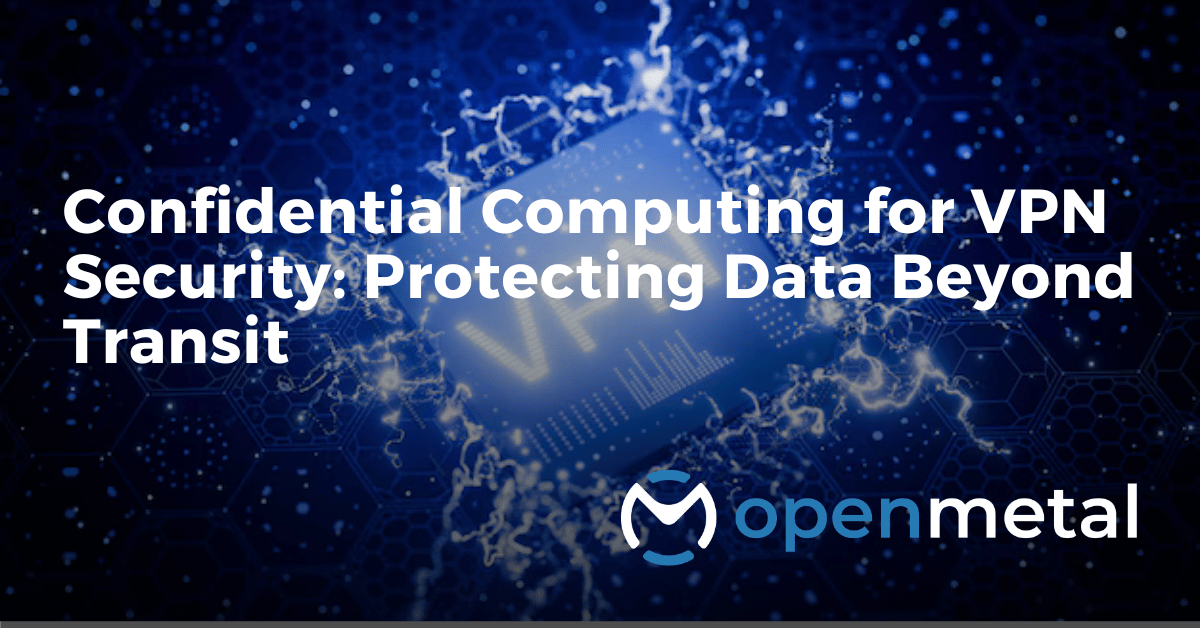
VPNs encrypt data between users and servers, offering essential protection for data in transit. But that protection ends once the data reaches the VPN server. Confidential computing fills this gap—ensuring data stays secure even while it’s being processed. In this post, we explore how to enhance VPN infrastructure with confidential computing and how OpenMetal’s platform makes it practical to deploy.
Where Traditional VPN Security Falls Short
VPNs do a great job protecting data while it’s traveling over the internet. They encrypt your traffic and make sure it stays private from point A to point B. This same encrypted transit is also why many users rely on an X VPN to protect private messages, account credentials, and activity from interception when accessing social media on shared or public networks. But once that data arrives at its destination, usually a server, it gets decrypted so it can be used. And that’s where the real problem starts.
At this point, the data is sitting in memory on the server in plain text. If someone manages to break into that server—whether through a software vulnerability, a misconfigured hypervisor, or even a malicious insider—they can see everything. The VPN can’t help anymore because its protection stops at the endpoint.
This kind of exposure is a serious concern for businesses that handle sensitive data, especially in fields like healthcare, finance, and blockchain. Regulations like HIPAA and GDPR require more than just encrypted transit—they demand protection every step of the way.
There’s another issue too: many servers run multiple virtual machines on the same physical hardware. That means your data could be sharing space with someone else’s workload. If there’s a security flaw in the virtualization layer, everything on that machine could be at risk.
In today’s threat landscape, VPNs just aren’t enough. Organizations need to secure not only the journey of the data but also its destination—especially while it’s being processed. That’s where confidential computing steps in, offering a way to keep your data protected even inside the server itself.
How Confidential Computing Enhances VPN Security
Confidential computing adds a powerful layer of protection that VPNs can’t provide on their own. It works by using trusted execution environments (TEEs), which are built directly into the server’s hardware, to create a secure space in memory. This space keeps data protected even while it’s actively being processed.
With Intel TDX (Trust Domain Extensions), workloads can run inside secure virtual machines. Not even the host operating system or hypervisor can peek into the memory of these VMs. That means the data stays isolated and safe—no matter what else is running on the machine.
This extra layer of security is especially useful when you’re handling VPN traffic. Once the data reaches the server and gets decrypted, confidential computing steps in to keep it protected. It’s a critical upgrade for anyone who needs to secure sensitive data end-to-end—not just in transit, but all the way through processing.
When deployed on OpenMetal’s bare metal infrastructure, which supports Intel TDX on XL V4 and XXL V4 servers, this technology becomes even more powerful. With full control over the hardware and no noisy neighbors, you can build a VPN solution that keeps your data private from start to finish.
What You Need for a Confidential VPN Setup
Building a VPN with confidential computing in mind requires the right hardware and configuration. With OpenMetal’s infrastructure, this setup is not only possible—it’s practical.
Here’s what you’ll need:
- An XXL V4 Bare Metal Server with Intel TDX
OpenMetal’s XXL V4 servers come equipped with Intel 5th Gen Xeon CPUs that support Intel TDX. This enables you to create trusted execution environments where even the host OS can’t access what’s running in memory. - A TDX-Compatible Hypervisor
Use an open-source hypervisor like KVM or QEMU to launch virtual machines that leverage Intel TDX. These VMs isolate your data from other processes, even within the same server. - Encrypted NVMe Storage
To protect sensitive VPN logs, keys, and configurations, take advantage of encrypted NVMe storage built into your deployment. This ensures your data remains secure—even if a drive is accessed outside the environment. - VLAN-Isolated Networking
Dedicated VLANs help keep VPN traffic segmented from other network activity. This enhances compliance and makes it harder for attackers to pivot inside your network. - Optional: H100 GPU for Analytics
If your VPN setup involves real-time analytics or other compute-intensive tasks, you can add an H100 GPU to your XXL V4 server. The GPU can be attached to TDX-enabled VMs using PCIe passthrough—giving you performance without sacrificing security.
This setup gives you full-stack protection—from hardware to application—and puts you in control of your secure VPN environment.
Example Use Case
A privacy-first infrastructure provider, similar to clients running blockchain validator nodes or crypto trading platforms, deploys its secure VPN environment on OpenMetal’s Intel TDX-enabled XXL V4 bare metal servers. Each VPN endpoint operates within a TDX-protected virtual machine, ensuring that decrypted data remains isolated—even from the underlying hypervisor.
Security-sensitive logs and authentication keys are written to encrypted NVMe storage, while VLAN-isolated networking ensures traffic segmentation. For providers that analyze performance trends or detect anomalies in real-time, H100 GPUs can be added to boost throughput via PCIe passthrough—all while keeping the core environment confidential.
This model closely mirrors deployments OpenMetal supports today for companies in blockchain and data analytics, and it reflects the same priorities: low-latency infrastructure, strong isolation, and zero trust from the ground up.
Final Thoughts
VPN technology is only as secure as its weakest link. Confidential computing fills the final gap—protecting data while it’s in use. With OpenMetal’s Intel TDX-ready bare metal servers and optional GPU passthrough, you can deploy high-trust VPN for USA or other local infrastructure that meets modern security demands. If you’re ready to explore confidential computing for VPN workloads, contact us.
Read More on the OpenMetal Blog



































